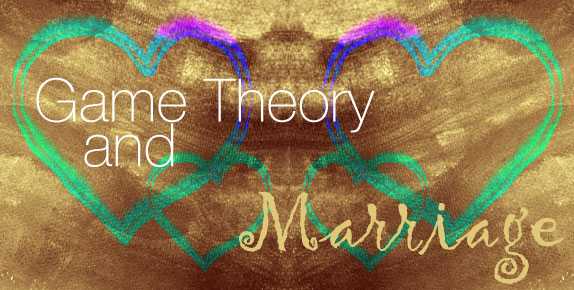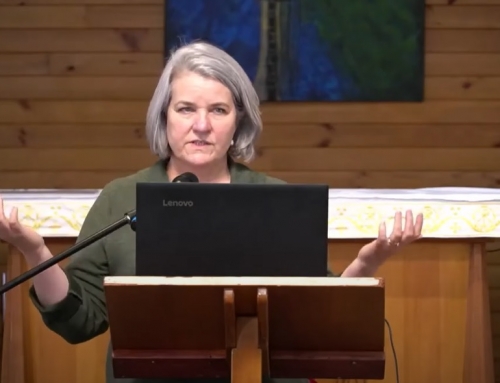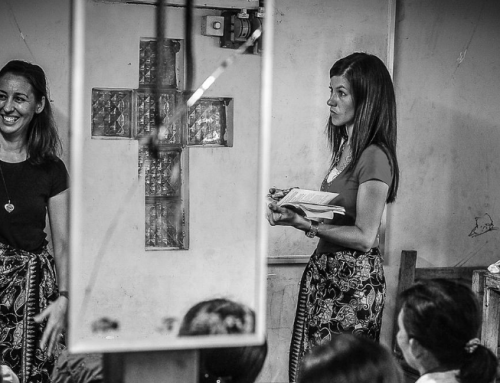In her book, It’s Not You, It’s the Dishes, Daily Beast editor Paula Szuchman argues that economics can save your marriage.
This is an extract from The Daily Beast
Jun 13, 2012
http://www.thedailybeast.com/articles/2012/06/13/marriage-and-the-art-of-game-theory.html
Marriage and the Art of Game Theory
Game theory is the study of how we make decisions in strategic situations. To see how this relates to marriage, imagine a couple with a refrigerator that’s been empty for three days. Husband and wife are in a standoff. They’ve been ordering Pizza every night but God help Joel if he’s going to go to the supermarket; he’s gone food shopping the last five Saturdays while Lisa played tennis. Lisa’s not going, either—she does everything around the house, including folding Joel’s underwear and paying the bills, which means unless Joel wants to do the banking and dig his dirty clothes out from under the bed, he’s going to be the one hauling his sorry self to the supermarket. Lisa can wait. She’s waited this long.
Paula Szuchman on how game theory can fix your marriage.Almost all couples are guilty of engaging in a bit of brinkmanship, scheming to triumph in an ongoing argument, or strategizing to get what they want. These situations present couples with the possibility of a “cooperative strategy,” in which two parties work together to come up with a reasonable solution, and a “noncooperative strategy” where it’s every man for himself. The noncooperative option is often the most tempting, but often has dire consequences if it fails (eg marriage breakdown), whereas the cooperative option is annoying, but rarely as risky.
To cooperate or not to cooperate? To budge or stand your ground? To say “OK, fine” or “not a chance”? These are questions married people find themselves asking with surprising frequency.
Ideally, the answer is always cooperate, budge, and say OK. But in practice, when there’s baggage involved and a history together and scars from past relationships, getting to that point takes effort.
The great thing about game theory is that it tackles situations in which you can’t have it all, but you’d like to at least achieve the best results possible. Note those three magic words: best results possible. That’s not the same as “getting what I want” or being “right,” two scenarios most of us would admittedly prefer.
But if game theory teaches us anything, it’s that relationships aren’t about having it all, they’re about having all you can under the circumstances.
In your marriage, those circumstances include the obvious, though often overlooked, fact that there’s another person involved: your spouse—a spouse who also happens to be after his or her own best results.
 “It’s Not You, It’s the Dishes (originally published as “Spousonomics”): How to Minimize Conflict and Maximize Happiness in Your Relationship” by Paula Szuchman and Jenny Anderson. $11.68; Random House Trade Paperbacks.
“It’s Not You, It’s the Dishes (originally published as “Spousonomics”): How to Minimize Conflict and Maximize Happiness in Your Relationship” by Paula Szuchman and Jenny Anderson. $11.68; Random House Trade Paperbacks.
With that in mind, here are three strategies game theory provides for improving the outcomes of potential conflicts with your spouse:
- Think ahead. How will he react to what I’m about to do or say? And how should that reaction influence my behavior right now?
- Learn from the past. How did she react the last time I did this? How can I do things differently now to avoid the same outcome?
- Put yourself in his shoes. This doesn’t mean considering what you would do if you were him, but what he would do if he were him, which he is.
This sounds like such reasonable advice, yet in the heat of the moment, so many of us routinely do the opposite. Getting back to Joel and Lisa and their refrigerator standoff: they’re not even trying to put themselves in each other’s shoes, and they’re forgetting that they’re both super-stubborn. Instead, they’re playing a game of chicken, also known as brinksmanship, with the refrigerator, where the possible outcome is never again eating a home-cooked meal (never mind, hating each other). A noncooperative strategy would ensure that very result. But a cooperative strategy would lead to meatloaf, roast chicken, quinoa salad, romantic dinners, and all sorts of other great stuff that married people can enjoy if they put their minds to it.
Paula Szuchman is deputy managing editor of Newsweek & The Daily Beast. She was previously a front-page editor at The Wall Street Journal, and is the author of It’s Not You, It’s the Dishes. Follow her on Twitter @paulaszuchman.





